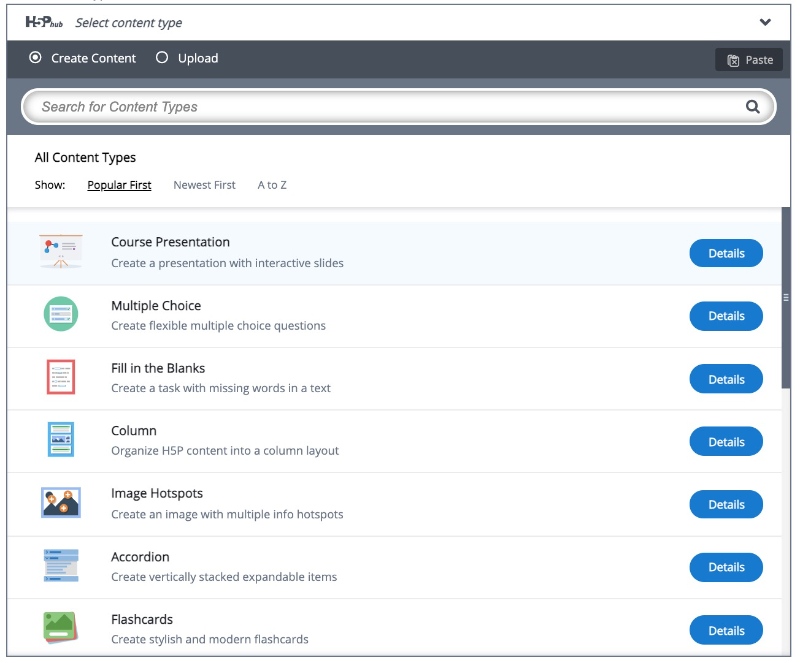
How Can an LMS Help Automate My Learning Operations?
To put it simply, learning and enrichment centers look for an LMS that automates their learning operations. Automation will ultimately reduce costs, allowing enterprises to scale efficiently.
An LMS helps enterprises automate learning operations in four main areas:
Content authoring
Content delivery
Content management
Scheduling and Booking
Discover how an LMS streamlines these operations, including instances where transitions overlap, while maintaining a smooth learning experience for students.
Also remember that an LMS excels at efficiently tracking these four areas. Enabling enterprises to measure and analyze specific stages with data insights only expedites learning operations even more.
Let’s dive deeper into these processes.
Content Authoring
Learning and enrichment centers are judged on the learning experiences they provide and the achievements they produce.
When parents enroll their children in a course, they’re not just paying for the teacher's time. They also pay for the content provided by the learning center as a valuable product. The more value the learning content has, the more parents will invest.
Companies can license and use educational materials such as physical student books, interactive e-books, and step-by-step teaching manuals from reputable publishers. Unfortunately, these high-quality learning materials can be astronomically expensive. Many companies design and create their own learning materials internally. Although creating e-learning materials is no easy feat, an LMS can automate this process by providing course creator tools and learning design functionalities.

For instance, certain LMSs provide pre-designed course templates that provide learning designers with the framework to create content according to best practices. These templates include learning objectives, review sections, and assessments.
After the course structure is in place, H5P is a popular interactive content creation tool. It allows users to create and embed all kinds of interactive multimedia content, including quizzes, directly into your course. Content creator tools also include real-time co-authoring, version control, and commenting capabilities, allowing teams to work more productively and collaboratively.
An LMS provides a flexible way to create, reuse, edit, and customize courses. This simplifies the content authoring process. Not to mention the money they save on external resources and licensing fees.
Content Delivery
After your enterprise has unique content, the next focus is on knowledge transfer. How can your educators deliver this content to your students effectively?
Some traditional teaching methods such as passive instruction can affect class learning pace. These outdated teaching methods slowdown learning and rarely promote active learning. This is where educators can use LMS online learning tools to help teachers integrate gamification techniques and effective microlearning practices.
My favorite is interactive video. It’s an H5P multimedia presentation that allows learners to actively engage with interactive elements such as clickable buttons, hotspots, quizzes, and other engaging features, all embedded over the video content.

These features prompt learners to interact and respond with the content in real-time.
Using online gamification tools and microlearning techniques allows instructors to automate classroom interactions, increase learning pace, create an active learning environment, and maximize opportunities to create engaging knowledge exchanges.
Content Management
All-in-one LMS platforms have an integrated Content Management System (CMS). This system handles courses and learning materials outside of a live class using cloud storage. Cloud storage allows teams to upload resources, manage and organize content in a centralized location. Once material is uploaded, a CMS can help teams manage content and automate processes through categorization, tagging, and access control.
Categorizing allows content to be put into logical groups or categories such as subjects, topics, modules. By assigning appropriate categories, learning and enrichment centers can organize and retrieve content efficiently. Tagging is a feature that allows learning designers to attach descriptive keywords or labels to course materials. These tags make searching easier by highlighting key themes, concepts, or keywords familiar to students.

Access control allows your team to decide what your learners can view and set exactly when it becomes available. This helps provide sequential content delivery, which helps learners progress through the course materials in a structured and organized manner.
A CMS offers seamless automation that reduces the need for extensive filing and shelves of lesson plans and student books – essential when dealing with thousands of hours of material.
Scheduling and Booking
An LMS can automate scheduling and booking processes for learning and enrichment centers in two main ways: self-service registration and automated communication.
Self-service registration offers parents or students access to the LMS portal, browse through the available courses, and register for the ones they prefer. Learning centers may receive video submissions, or assign a placement test before enrolling a student. Both methods reduce the need for time-consuming in-person interviews.
Once a student has been enrolled, an LMS can send automated emails or notifications to parents and students regarding upcoming courses, homework deadlines, payment reminders, and other relevant scheduling information. This eliminates manual communication, keeping large cohorts of learners and parents informed in a timely manner.
The specific lessons available to administration depend on the content your team has created and uploaded to the cloud.
Tracking
An LMS can track and gather vast amounts of data about how students interact with content. Learning analytics help enterprises make data-informed decisions about content authoring, content delivery, content management and scheduling and booking processes.
Read more about how your enterprise can benefit from LMS analytics.
OOOLAB

OOOLAB is an EdTech company specializing in LMS technology. If you're interested in automating your enterprises' learning operations to reduce costs and scale efficiently, chat with our EdTech experts.
Click this link:






